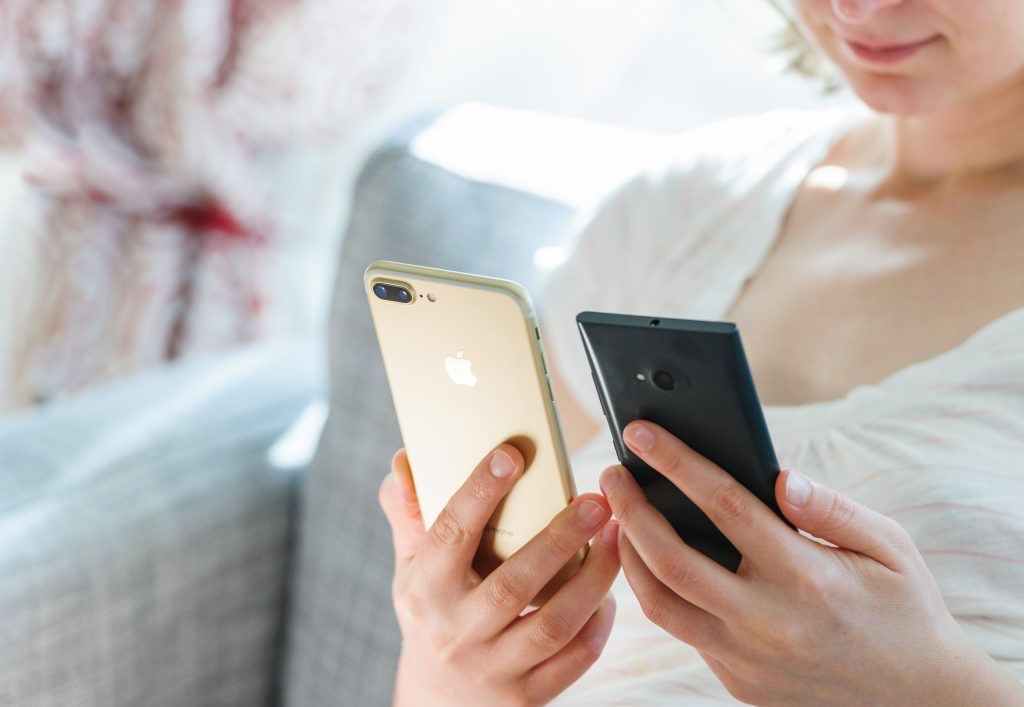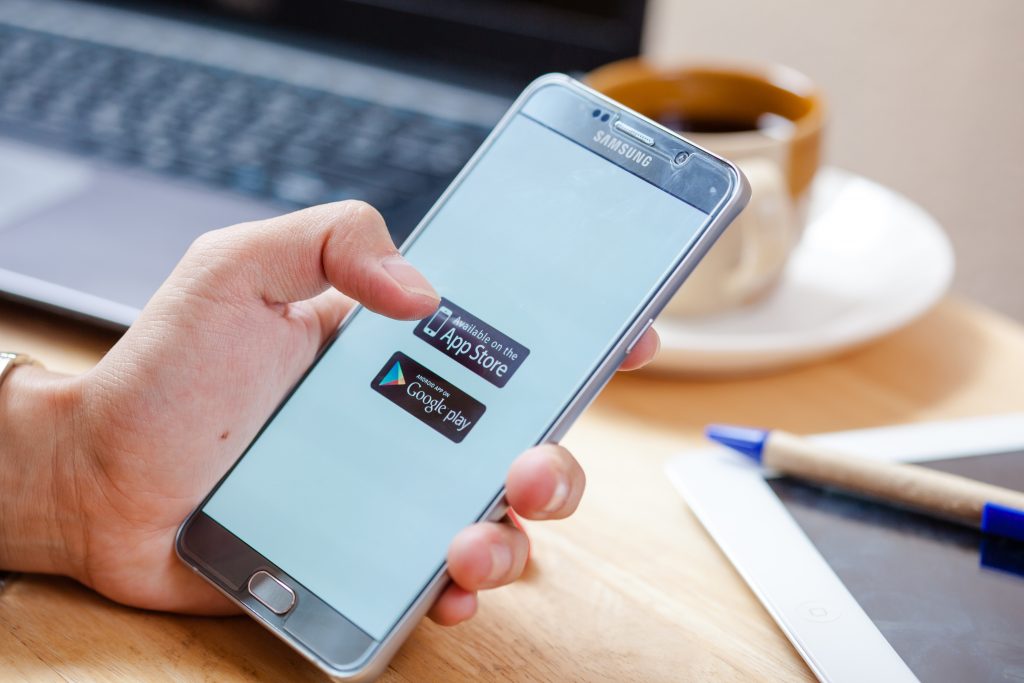Picking Your New Mobile Phone: iOS vs Android

According to Statista, 52.1% of U.S. consumers use devices powered by Google Android operating systems. However, over the last decade Apple has been heavily competing for market share in the mobile electronic industry. In 2012, less than 30% of U.S. consumers used a device powered by Apple iOS. Now, Apple iOS users make up 47% of the U.S. market share. Android holds the majority market share by using many different service providers and device manufactures. Needless to say, if you are in the market for a new mobile device, you will probably end up with a Google Android operating system or Apple iOS, as these operating systems are installed on over 99% of devices currently in circulation throughout the U.S.
While there are advantages and disadvantages to both Google Android and Apple iOS, it widely comes down to the preference of the end user. Android offers more of a PC-like setup and overall look. It offers more customization within its interface and basic features. In terms of the home screen, Android allows you to set up the device just how you want it. On the flip side, Apple iOS has a much more uniform design that many consumers argue is more user friendly. However, iOS offers significantly less design options for your home screen. Add a picture and rearrange your apps are virtually your only home screen customization options while using iOS.
For the most part, the longevity of a device running iOS far outweighs that of its counterpart devices running Android operating systems. As a consumer, this means you would be able to use an Apple device with minimal issues for a longer period of time than most Android powered devices. Furthermore, the resale value for the majority of Apple devices is typically much higher than Android devices.
Now let’s talk about their app stores. By and large, application developers tend to prefer Apple’s App Store over the Android Marketplace. Studies show that people using iOS spend more time on their devices than Android users. Furthermore, Android users tend to be more price-conscious buyers. This makes Apple’s App Store the preferred platform for app developers looking for a new revenue stream. Apple exercises strict quality control on the apps they accept into their App Store, giving the app developer more credibility for developing an iOS app. As a consumer looking to make a switch from iPhone to Android, or vice versa. Keep in mind, you may have to purchase many applications again. Most apps that are purchased via one-time fee will not transfer from the Google Play Store to Apple’s App Store, and vice versa.

In summary, like most choices a consumer makes; there are pro and cons to both the Google’s Android operating systems and Apple’s iOS. It all boils down to the preference of the end user. Many consumers choose to go with the same operating system their friends and family use. For example, a consumer might choose iOS because they are able to iMessage and Facetime with the people they communicate with the most. On the other hand, a consumer might choose an Android operating system if they wanted more customization or want to download apps that only run on Android.
Want to learn more? The technicians at Genius Phone Repair store are extraordinarily knowledgeable and eager to help! Find a location near you today.


prednisone nz: http://prednisone1st.store/# prednisone 15 mg daily
local personals: senior singles chat – single woman free
http://cheapestedpills.com/# best erectile dysfunction pills
canadian neighbor pharmacy canadian family pharmacy
buying cheap propecia without prescription order cheap propecia tablets
amoxicillin 500 coupon: buy amoxicillin over the counter uk purchase amoxicillin 500 mg
order cheap propecia pills propecia tablets
cost of generic mobic without rx order cheap mobic without a prescription get mobic without prescription
buy amoxicillin 500mg canada: http://amoxicillins.com/# amoxicillin buy canada
https://propecia1st.science/# buying generic propecia no prescription
Read information now.
amoxicillin buy canada 875 mg amoxicillin cost – where to buy amoxicillin 500mg without prescription
Read here.
medicine erectile dysfunction: best ed pills at gnc – cheap ed pills
ed treatment pills: erection pills viagra online – п»їerectile dysfunction medication
cost cheap mobic can you get cheap mobic no prescription where can i get generic mobic tablets
where can i get mobic without rx: where buy generic mobic online – can i buy mobic without a prescription
canadian pharmacy world reviews canada pharmacy
http://cheapestedpills.com/# erectile dysfunction medications
amoxicillin 500 mg online amoxicillin 500mg cost – amoxicillin 500
amoxicillin medicine over the counter: how to buy amoxycillin buy amoxicillin without prescription
can i order cheap mobic: can you buy generic mobic price – cost of generic mobic pill
amoxicillin 800 mg price: https://amoxicillins.com/# amoxicillin 500 mg price
Some are medicines that help people when doctors prescribe.
cost of mobic for sale: where can i buy cheap mobic pills – can i order mobic
Actual trends of drug.
get cheap propecia no prescription cost propecia without insurance
ed drugs online from canada: canadian world pharmacy – legitimate canadian online pharmacies
https://certifiedcanadapharm.store/# canadian pharmacy prices
http://indiamedicine.world/# mail order pharmacy india
online pharmacy india: online shopping pharmacy india – reputable indian pharmacies
pet meds without vet prescription canada: safe canadian pharmacy – canadian online pharmacy
http://indiamedicine.world/# indian pharmacy online
canadian king pharmacy: canadian pharmacy ltd – canadian drug prices
http://mexpharmacy.sbs/# buying prescription drugs in mexico
canadian pharmacy ed medications: reputable canadian online pharmacy – canadian pharmacy online
http://indiamedicine.world/# best online pharmacy india
canadadrugpharmacy com: best canadian pharmacy – canadian pharmacy checker
india online pharmacy: india online pharmacy – world pharmacy india
http://mexpharmacy.sbs/# best online pharmacies in mexico
http://certifiedcanadapharm.store/# my canadian pharmacy reviews
reputable indian online pharmacy: Online medicine order – best india pharmacy
is canadian pharmacy legit: canada pharmacy world – canadian world pharmacy
http://indiamedicine.world/# best online pharmacy india
mexican online pharmacies prescription drugs: mexico pharmacies prescription drugs – purple pharmacy mexico price list
http://indiamedicine.world/# online pharmacy india
https://certifiedcanadapharm.store/# canadian pharmacy online ship to usa
purchase ivermectin: ivermectin for sale – ivermectin lotion cost
https://gabapentin.pro/# neurontin tablets 300 mg
neurontin 600 mg pill buy gabapentin online neurontin brand name
http://azithromycin.men/# can i buy zithromax online
where to buy neurontin: neurontin 100mg cap – neurontin generic brand
https://azithromycin.men/# zithromax drug
https://azithromycin.men/# zithromax antibiotic without prescription
buy zithromax online cheap: zithromax over the counter canada – zithromax 250 mg pill
neurontin 100 mg cap neurontin drug neurontin 100 mg cap
https://gabapentin.pro/# neurontin 600 mg
ivermectin iv: ivermectin otc – ivermectin 3mg tablets price
http://gabapentin.pro/# neurontin cap 300mg
buy paxlovid online: paxlovid pharmacy – paxlovid pharmacy
http://paxlovid.top/# Paxlovid buy online
http://ed-pills.men/# ed medication
top erection pills: generic ed drugs – new ed treatments
https://misoprostol.guru/# buy cytotec
https://misoprostol.guru/# cytotec abortion pill
https://avodart.pro/# where to buy cheap avodart online
https://lisinopril.pro/# lisinopril 40 mg price
https://misoprostol.guru/# buy cytotec pills online cheap
http://lipitor.pro/# can you buy lipitor over the counter
http://avodart.pro/# buy cheap avodart
http://ciprofloxacin.ink/# cipro online no prescription in the usa
http://lisinopril.pro/# prinivil coupon
п»їbest mexican online pharmacies: mexican rx online – п»їbest mexican online pharmacies
pharmacies in mexico that ship to usa: mexican online pharmacies prescription drugs – buying prescription drugs in mexico
canadian discount pharmacy: Certified Canada Pharmacy Online – reputable canadian online pharmacies
mexican mail order pharmacies: mexico drug stores pharmacies – п»їbest mexican online pharmacies
price prescriptions
mexican rx online: mexican drugstore online – mexico drug stores pharmacies